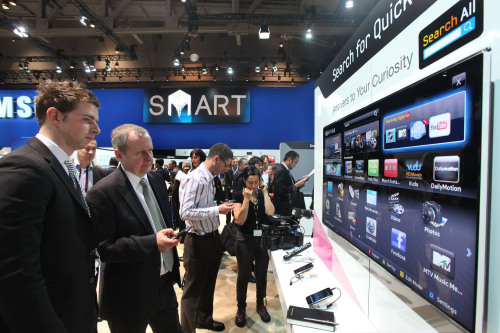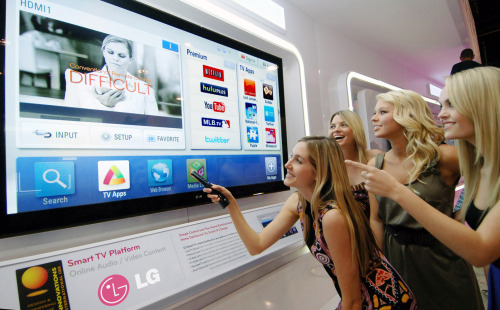Korean electronics companies compete in rolling out higher-performance, slicker smart TVs
Korean electronics giants of Samsung and LG are engaging in a heated competition to seize the next stage of home entertainment with new smart TVs and application marketplaces.
The world’s two largest TV manufacturers have recently released bigger, thinner and slicker products that allow users to access the Internet and enjoy a wider range of applications while watching TV.
Smart TV has emerged as a new battleground for technology powerhouses as its multifunctionality and compatibility with other Web-based devices such as computers, smartphones and tablet PCs are poised to open a new era of home entertainment.
Samsung first hit the market with the world’s first smart TV in February 2010, aiming to provide “smart lifestyle” for users.
Yoon Boo-keun, president of Samsung Electronics’ visual display business president emphasized smart and 3-D TVs as the next key items in the information technology industry at the Consumer Electronics Show that drew its curtains on Jan. 9 in Las Vegas.
 |
Smart TVs from Samsung Electronics on display at the Consumer Electronics Show in Las Vegas earlier this month. (Samsung Electronics) |
“Smart TV is an enhanced TV experience” and 3-D TV provides “a new way of life,” he said.
LG has hustled up to unveil its smart TVs in preparation for a grand comeback as a leading consumer electronics maker.
It suffered its first operating deficit in the third quarter of last year after its handset operations lagged behind the smartphone competition.
The company launched two models of smart TVs on Tuesday in the Korean market, which were introduced at the IFA in Berlin in September.
Yet Samsung is in the lead in the race, rolling out 11 models here. It aims to add several products in its lineup this year to more than 20.
Samsung’s advantage lies in rich content and applications accumulated since last year. It provides some 380 applications from games to social networks for smart TVs in around 120 countries.
Its online application store has logged 2 million application downloads in about 11 months of its launch, the firm said last week.
More than 20,000 applications are downloaded on average daily by users across the world, it added.
LG’s new Infinia 3D smart TV boasts an easier user interface and better interconnectivity with its NetCast system along with fun screen control.
The system carries a home dashboard, which gives access to a variety of premium content and applications all on a single screen. They can also add favorite websites on display.
The interface is controlled by the “Magic Motion Remote Control,” which LG described as mirroring a “Wii-like” experience. Viewers can find any content by simply pointing the controller at a list of options on the screen, then clicking a button.
“LG Smart TVs embody the most advanced technology of any internet-linked TVs, providing users with endless entertainment options,” said Havis Kwon, president and CEO of LG Electronics Home Entertainment Company.
 |
LG Electronics on display at the Consumer Electronics Show in Las Vegas earlier this month. (LG Electronics) |
To defend their top spots in the world TV realm, Samsung and LG have been courting software developers since last year to create applications for their app stores.
Samsung formed partnerships with local web service providers like Naver, Daum and SK Communications to build up more abundant and diverse content, it said.
It is also working with U.S.-based companies like Blockbuster, Netflix and Pandora and U.K.-based LOVEFiLM for localized media programming.
LG also signed content sharing agreements with local and foreign firms including CJ Corp., YouTube, Netflix and MLB TV.
The firm said late it hopes to sell up to 40 million flat-screen TVs this year and will scale up smart TV production to at least one-third of the entire TV lines.
Samsung aims to double the global sales of smart TVs to 12 million units this year, more than a third of the worldwide market.
It also looks to quadruple sales of 3-D TV sets to between 8 million to 9 million units this year.
“Samsung plans to constantly overwhelm the market this year as the first year of the smart TV era with new products astonishingly evolved in every respect ― design, function, contents and so on,” said Lee Sang-chul, senior vice president of Samsung Electronics’ visual display business.
In line with the ambitious goals, Samsung laid out bold investment plans worth 30 trillion won this year to nurture growth engine areas and secure its dominance in TVs, LCDs and memory chips.
LG also plans to invest nearly 14.3 trillion won ($12.7 billion)this year largely in extra LCD and LED panel facilities, the firm said.
Market research firm DisplaySearch predicts the smart TV market will grow nearly 65 percent to more than 67.3 million units this year from around 41 million last year, and to about 88.9 million units by 2014.
Samsung Electronics saw its annual sales reach an all-time high of 154 trillion won last year, while LG Electronics fetched nearly 55.8 trillion won in revenue with 16 percent sales growth in its home entertainment division in the fourth quarter.
By Shin Hyon-hee (
heeshin@heraldcorp.com)









![[Today’s K-pop] Blackpink’s Jennie, Lisa invited to Coachella as solo acts](http://res.heraldm.com/phpwas/restmb_idxmake.php?idx=644&simg=/content/image/2024/11/21/20241121050099_0.jpg)